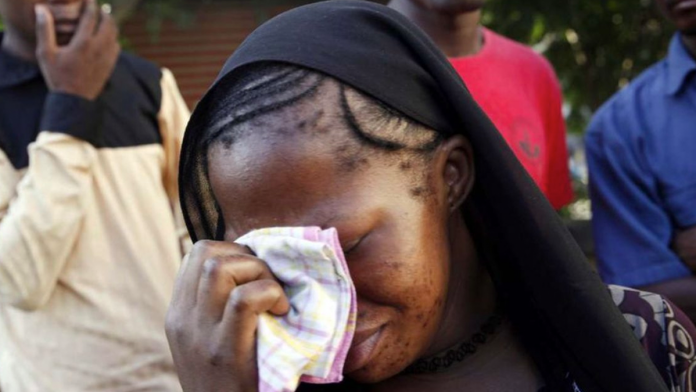In Kenya babies are being sold for as low as £300.
According to the investigation conducted by BBC, a certain Rebecca (who was a dropout of school because of her moms inability to pay her fees) got pregnant by an older man who promised her marriage but left after she got pregnant.
She gave birth to the child, she raised him for a year and few months until one fateful day she slept and woke up but the child was gone.
She searched endlessly even through many children centres but never saw him again.
What’s shocking is that Rebecca isn’t the only one. Many other women in Kenya can testify that their children have gone missing at one point or the other and were never seen again.
Mothers in Nairobi are losing their children involuntarily to a thriving black market in Kenya.
In its investigation, African eye has documented serveral evidences of children being snatched from their mothers who are vulnerable and they are sold for huge profits.
Children are being trafficked from clinics and babies are being stolen from hospitals ran by the government.
Illegal street clinics have even been discovered to have delivery rooms for mothers. These are known locations For black market trade of babies in Nairobi.
These children are sold to women who are barren or to random people who want to use them for rituals/sacrifices.
It’s crucial to note that there are no reliable statistics of child trafficking in Kenya. There are no government reports, no surveys, etc.
the agencies that are meant to uncover the black market, its activities and rescue the children are highly lacking in resources and staff.
These women are targeted intentionally because they are vulnerable, they don’t have the voice, the resources or platform to gain the attention of the media and get help from the government.
One of the driving forces of this black market is the cultural stigma that exists on the subject matter of infertility.
In Africa once a woman gets married and after a year or two she hasn’t given birth, the stigma begins.
Every married woman is expected to have a child immediately and a male child at that. And so once a woman can’t get pregnant for a child, another option available is to steal a child.
It’s important to understand that the pressure barren women face from the society, their friends and even their family members (who would kick them out of their homes if they don’t have child) becomes a very high motivating factor.
They become desperate and start looking for means to get a child and then they get in contact with traffickers who will give them any child for a stipend.
We should never assume that because these mothers are on the streets, they don’t have feelings neither do they demand justice.
They have feelings and they demand justice and so what can be done? How can this be avoided?
- Firstly, adequate welfare plans should be taken to take young girls and women off the streets.
They should be employed or trained and equipped with relevant skills that will provide a source of income for them and their children. - The government should create a system that is tight and accountable for babies given birth to in Kenya at every hospital and clinic. The children and their parents should have records with the government.
- The government should create systems that enable the smooth transfer of unwanted babies to foster care.
The government should have systems that connect unwanted babies with foster parents who can take good care of them.
There should be legal ways to acquire a child who was abandoned without having to steal them or buy them from black markets. - The government must first be the change they want to see.
In hospitals run by the government in Kenya, their own staffs are selling children for the highest price possible on the black market and one of them was identified by African Eye as Fred Leparan.
It is also noteworthy that the hospital declined requests by BBC to comment and despite the claims laid against Fred with tangible evidence, he still kept his job.
The government must be ready to be open and transparent with the public about cases like this.
There must also be a clean sweep of the hospital to eliminate wicked and ruthless staff who sell babies and children. - More platforms need to be raised for child trafficking in Kenya. Media companies should pay attention to this, NGOs, humanitarians, successful and influential individuals should incline their attention to these cases.
- Agencies who are supposed to attend to cases like this should be equipped with the adequate resources needed and even the appropriate amount of staffing needed to carry out their job with immediate effect.
In the end, the government must recognize that every human being is worthy. Worthy of justice, worthy of care, worthy of opportunities to thrive and worthy of a good standard of living.
Every mother is worthy of the child of her womb. Whether strong or weak, rich or poor.






